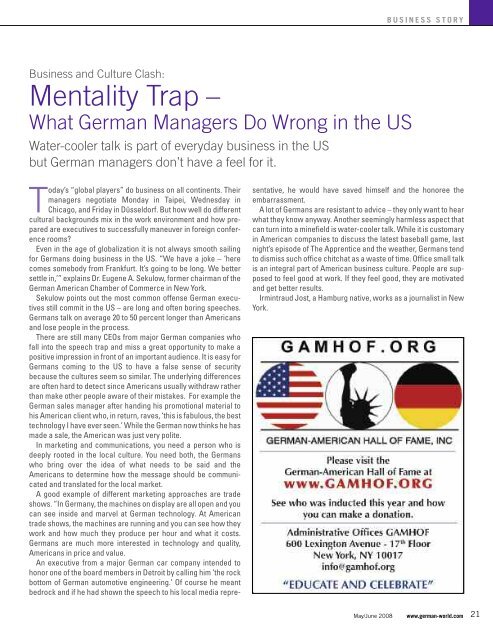May/Jun 2008 - German World Magazine
May/Jun 2008 - German World Magazine
May/Jun 2008 - German World Magazine
Sie wollen auch ein ePaper? Erhöhen Sie die Reichweite Ihrer Titel.
YUMPU macht aus Druck-PDFs automatisch weboptimierte ePaper, die Google liebt.
Business and Culture Clash:<br />
Mentality Trap –<br />
What <strong>German</strong> Managers Do Wrong in the US<br />
Water-cooler talk is part of everyday business in the US<br />
but <strong>German</strong> managers don’t have a feel for it.<br />
Today’s “global players” do business on all continents. Their<br />
managers negotiate Monday in Taipei, Wednesday in<br />
Chicago, and Friday in Düsseldorf. But how well do different<br />
cultural backgrounds mix in the work environment and how prepared<br />
are executives to successfully maneuver in foreign conference<br />
rooms?<br />
Even in the age of globalization it is not always smooth sailing<br />
for <strong>German</strong>s doing business in the US. “We have a joke – ‘here<br />
comes somebody from Frankfurt. It’s going to be long. We better<br />
settle in,’” explains Dr. Eugene A. Sekulow, former chairman of the<br />
<strong>German</strong> American Chamber of Commerce in New York.<br />
Sekulow points out the most common offense <strong>German</strong> executives<br />
still commit in the US – are long and often boring speeches.<br />
<strong>German</strong>s talk on average 20 to 50 percent longer than Americans<br />
and lose people in the process.<br />
There are still many CEOs from major <strong>German</strong> companies who<br />
fall into the speech trap and miss a great opportunity to make a<br />
positive impression in front of an important audience. It is easy for<br />
<strong>German</strong>s coming to the US to have a false sense of security<br />
because the cultures seem so similar. The underlying differences<br />
are often hard to detect since Americans usually withdraw rather<br />
than make other people aware of their mistakes. For example the<br />
<strong>German</strong> sales manager after handing his promotional material to<br />
his American client who, in return, raves, ‘this is fabulous, the best<br />
technology I have ever seen.’ While the <strong>German</strong> now thinks he has<br />
made a sale, the American was just very polite.<br />
In marketing and communications, you need a person who is<br />
deeply rooted in the local culture. You need both, the <strong>German</strong>s<br />
who bring over the idea of what needs to be said and the<br />
Americans to determine how the message should be communicated<br />
and translated for the local market.<br />
A good example of different marketing approaches are trade<br />
shows. “In <strong>German</strong>y, the machines on display are all open and you<br />
can see inside and marvel at <strong>German</strong> technology. At American<br />
trade shows, the machines are running and you can see how they<br />
work and how much they produce per hour and what it costs.<br />
<strong>German</strong>s are much more interested in technology and quality,<br />
Americans in price and value.<br />
An executive from a major <strong>German</strong> car company intended to<br />
honor one of the board members in Detroit by calling him ‘the rock<br />
bottom of <strong>German</strong> automotive engineering.’ Of course he meant<br />
bedrock and if he had shown the speech to his local media repre-<br />
sentative, he would have saved himself and the honoree the<br />
embarrassment.<br />
A lot of <strong>German</strong>s are resistant to advice – they only want to hear<br />
what they know anyway. Another seemingly harmless aspect that<br />
can turn into a minefield is water-cooler talk. While it is customary<br />
in American companies to discuss the latest baseball game, last<br />
night’s episode of The Apprentice and the weather, <strong>German</strong>s tend<br />
to dismiss such office chitchat as a waste of time. Office small talk<br />
is an integral part of American business culture. People are supposed<br />
to feel good at work. If they feel good, they are motivated<br />
and get better results.<br />
Irmintraud Jost, a Hamburg native, works as a journalist in New<br />
York.<br />
<strong>May</strong>/<strong>Jun</strong>e <strong>2008</strong> www.german-world.com<br />
21






